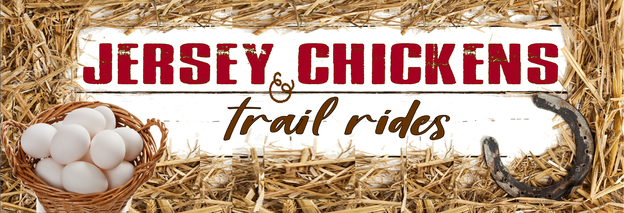Jersey Blacks are a breed cross using Rhode Island Red males and Barred Plymouth Rock females. The male chicks have a white spot on the top of their heads and can be separated from the solid black female chicks when they hatch. They are efficient producers of large brown eggs. They have excellent livability, and hens from this cross weigh about 5 1/2 lbs. They feather out mostly black with red feathers around their chest, neck, or back. They are known to start laying earlier then other standard breeds. $15. each
Chick Sexing Guarantee
On standard breeds,this procedure is about 90% accurate. This a means that you have a 10% chance of getting a rooster. If you ABSOLUTELY can not own a rooster, please purchase breeds which are sexed much more accurately. Sex links and auto-sexing breeds are sexed with a 99% success rate. This means your chance of getting a rooster is extremely rare. While we do our very best to sell properly sexed birds, please understand the difficulty in this task. We can not take back roosters that you can not keep.
Health Guarantee
We hand raise all of our chicks in the best conditions possible. They are fed medicated feed from the very first day and provided fresh clean water. Their room temperature is precisely monitored and they are socilaized as much as possible. Please understand that when purchasing baby chicks up to 4 weeks old, there is always a possibility of sudden loss. They require more care and closer monitoring then older birds. If you would prefer to avoid this possible situation, please purchase chicks at least 4 weeks old. We do not guarantee the survival of baby chicks once they leave our farm. We do not offer free replacements.
Vaccinations
All chicks will be vaccinated for Mareks Disease. We have put much thought into this decision. For many years we did not want to vaccinate, due to keeping the chicks as natural as possible. Due to the extreme popularity of back yard chickens, more and more people are asking about vaccinations. Mareks Disease is starting to become more common, with flocks of backyard chickens popping up in nearly every neighborhood. This disease can spread through the wind or on clothing and shoes of your neighbors who have chickens. It is not harmful to humans, but quite deadly to most chickens. 80% of any flock will likely not survive if they are exposed to Mareks. The vaccination is given on hatch day to the chicks. Medicated feed is still recommended for the first few months to control coccidosis, which is a completely different issue than Mareks.
On standard breeds,this procedure is about 90% accurate. This a means that you have a 10% chance of getting a rooster. If you ABSOLUTELY can not own a rooster, please purchase breeds which are sexed much more accurately. Sex links and auto-sexing breeds are sexed with a 99% success rate. This means your chance of getting a rooster is extremely rare. While we do our very best to sell properly sexed birds, please understand the difficulty in this task. We can not take back roosters that you can not keep.
Health Guarantee
We hand raise all of our chicks in the best conditions possible. They are fed medicated feed from the very first day and provided fresh clean water. Their room temperature is precisely monitored and they are socilaized as much as possible. Please understand that when purchasing baby chicks up to 4 weeks old, there is always a possibility of sudden loss. They require more care and closer monitoring then older birds. If you would prefer to avoid this possible situation, please purchase chicks at least 4 weeks old. We do not guarantee the survival of baby chicks once they leave our farm. We do not offer free replacements.
Vaccinations
All chicks will be vaccinated for Mareks Disease. We have put much thought into this decision. For many years we did not want to vaccinate, due to keeping the chicks as natural as possible. Due to the extreme popularity of back yard chickens, more and more people are asking about vaccinations. Mareks Disease is starting to become more common, with flocks of backyard chickens popping up in nearly every neighborhood. This disease can spread through the wind or on clothing and shoes of your neighbors who have chickens. It is not harmful to humans, but quite deadly to most chickens. 80% of any flock will likely not survive if they are exposed to Mareks. The vaccination is given on hatch day to the chicks. Medicated feed is still recommended for the first few months to control coccidosis, which is a completely different issue than Mareks.
